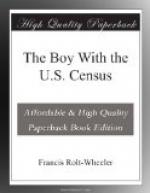“You are from Porto Rico yourself, Mr. Alavero?”
“I was never away from the island at all,” was the reply, “never even on a steamboat until I came to the United States last autumn; I came to show the people in your Congress that the coffee growers of Porto Rico need help.”
“Why?”
“Porto Rican coffee is the finest in the world,” the editor answered with a graphic gesture, “and when Porto Rico was Spanish we could sell in Europe at high prices, but now the European tariff against the United States includes us, and our coffee is taxed so that we cannot sell it. And the American market is satisfied with Brazilian coffee, which is of a cheaper grade.”
“Is coffee the principal crop down there?” queried the boy. “I notice that nearly half these papers and books deal with coffee plantations.”
“It is still, but not as it once was,” the Porto Rican answered. “Sugar and tobacco are the other big crops.”
“Coffee is easy to grow, isn’t it?” asked the boy. “It doesn’t want all the attention that cotton does?”
“After a grove is well-established, no, though we prune a great deal; but sugar, yes. That’s not such an obstacle though. There is plenty of labor on the island.”
“Isn’t the bulk of the island colored?”
“No, no, no,” answered the Porto Rican, shaking his finger in emphatic denial, “more than three-fifths are pure white, a much smaller proportion of negroes than in some of your Southern States. The negroes were slaves, but Spain freed them in 1873. There was no war.” He smiled. “We are a most peaceful people.”
[Illustration: GATHERING COCOANUTS. Where the census-taker in Porto Rico had to wait for his figures until the head of the house climbed down. (Courtesy of the Department of War.)]
“Not like our other accession from Spain,” Hamilton commented. “I mean the Philippines; you certainly couldn’t call the Filipinos peaceful, it seems to me that they come just about as wild as they make them.”
“Wild? You do not know the half!” said the excitable little editor, who, despite the frequency of his gestures and the volubility of his explanations was busily working with diagrams the while. “You know there was a census in Porto Rico in 1899?”
“I didn’t until this morning,” the boy answered “but as I see that most of these tables are compared with that year it is evident that there must have been.”
“There was a census,” the editor went on, after a pause during which he had been working over a column of figures, “and my uncle was a supervisor. Mr. Gatten—you know him?”
“Only by name,” Hamilton replied.
“He was in the Porto Rico census, too. Then in 1903 he went to assist in the census of the Philippines. It was done by the War Department, because the fighting was hardly over. You think the census difficult? You should hear my uncle! The Dattos were not all stopped fighting, because just as soon as the Philippine Commission thought it safe, the census began.”




